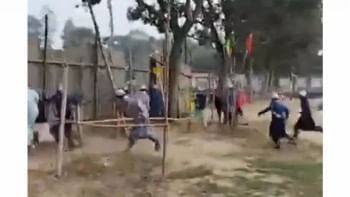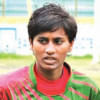When girls are forced off the field, nobody wins

A football match meant to celebrate talent and sportsmanship turned into yet another reminder of how deeply ingrained gender biases continue to deny girls their rightful place in public spaces. The Joypurhat incident on January 29, where a girls' football match was abruptly halted due to protests from religious hardliners, is not just an isolated event -- it reflects the persistent societal resistance to women's participation in sports.
Girls should not have to fight for their right to play.
The cancellation of the match following pressure from a conservative faction sends a chilling message: that girls pursuing their passion are still seen as a challenge to social norms. The Joypurhat incident is not about football alone -- it is about control, about the belief that women must conform to a dictated way of life, even when that life denies them basic freedoms.
A game of football became a battle for rights.
Bangladesh has witnessed remarkable achievements by female athletes on the international stage. From the SAFF Women's Championship victory to young girls excelling in grassroots tournaments, their progress has been an inspiring counter to regressive attitudes. Yet, incidents like this reveal the fragile state of this progress -- one moment of intolerance can push these young athletes back into the shadows.
What is most alarming is the inaction of the authorities.
The Chief Adviser's Office, in a press release, on January 30 said the interim government is deeply concerned by reports of incidents of women being prevented from engaging in recreational activities.
But that's only rhetoric. We demand action. Action against the perpetrators.
Meanwhile, the district administration of Joypurhat has formed a five-member committee to investigate the attack on a girls' football match venue.
No case was recorded over the attack till Friday (January 31).
This inaction is an endorsement of the very forces that seek to limit women's freedom. By cancelling the match, they validated the notion that girls in sports are controversial, rather than natural and celebrated.
If these young footballers are forced to step back today, what message does it send to the next generation? That their dreams are secondary to societal expectations? That their aspirations can be erased with the slightest objection? Such an environment stifles ambition and ensures that girls remain hesitant to step onto the field, fearing backlash instead of celebrating their potential.
Dreams should be nurtured, not censored.
Sport is more than just physical activity; it is empowerment. It builds confidence, resilience, and the ability to challenge limitations. The resistance to allowing girls to play is rooted in the fear of that empowerment. It is a deliberate attempt to keep them restricted, ensuring they never feel fully in control of their own lives.
The authorities must take responsibility. They must ensure that no child, regardless of gender, is denied access to sports. They must take a firm stand against regressive ideologies that seek to undo years of progress. The people of Bangladesh must also raise their voices -- not just for these young footballers, but for every girl who dares to dream beyond societal expectations.
Let the girls play. Let them thrive. Let them win -- not just on the field, but in life.

 For all latest news, follow The Daily Star's Google News channel.
For all latest news, follow The Daily Star's Google News channel. 










Comments